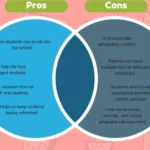Are you considering a career as a teacher and wondering if you’ll get paid during the summer break? Or maybe you’re a current teacher looking for ways to supplement your income during the off months. Whatever your situation, this article will provide you with a comprehensive guide to teacher pay during the summer months, as well as tips for budgeting, finding discounts, and making extra money. From exploring different summer pay options to discovering ways to maximize discounts and earn passive income, we’ve got you covered. So, let’s dive in and explore the truth about teacher pay over the summer.
Contents
- How Do Teachers Get Paid?
- Discounts for Teachers
- Other Ways to Make Money During Summer Break
- Conclusion
-
Frequently Asked Questions
- FAQs
- 1. Do teachers get paid over the summer?
- 2. Can teachers receive their paychecks during the summer?
- 3. How much do teachers get paid during the summer?
- 4. What other options do teachers have to make money during the summer?
- 5. Is it common for teachers to work during the summer?
- 6. Can teachers collect unemployment during the summer?
- 7. Can teachers use their summer break for professional development?
- 8. Do teachers get paid for attending professional development during the summer?
- 9. Can teachers get paid for creating lesson plans during the summer?
- 10. What are some budgeting tips for teachers during the summer months?
- References
How Do Teachers Get Paid?

Teachers may have a different pay structure than other professions. How teachers get paid depends on factors like annual salary, pro-rata salary, and summer pay options. Some teachers may receive a 10-month pay structure, while others may opt for a 12-month pay structure. Summer pay options may include spreading out paychecks over the summer or saving money during the school year to cover summer expenses. By understanding how they get paid, teachers can budget and plan for their finances accordingly.
1.1 Annual Salary vs. Pro Rata Salary
When discussing teacher pay over the summer, it’s important to understand the difference between annual and pro rata salary. Annual salary is the total amount a teacher is paid for the year, divided into equal paychecks over the course of the year. Pro rata salary, on the other hand, takes into account the number of days a teacher actually works and pays them accordingly. This means that teachers on pro rata contracts will not receive pay for the days they don’t work, such as weekends, holidays, and summer break.
For example, a teacher on a pro rata contract earning a salary of $50,000 per year may only receive $30,000 during the school year and not receive pay for the summer months. However, a teacher on an annual contract earning the same $50,000 per year would receive paychecks of $4,166.67 per month, including over the summer months.
It’s important to note that the majority of teachers in the United States are on pro rata contracts. This means that while teachers do not technically get paid over the summer, their annual salary is still divided into equal paychecks over the course of the year, including the summer months.
It’s also worth noting that some school districts offer the option for teachers to spread their pay over 12 months instead of 9 or 10 months, which can help with budgeting and cash flow. Additionally, some teachers may be able to work during the summer months and earn extra income.
1.2 The Myth of Summers Off
Many people believe that teachers have summers off and do not get paid during those months. However, this is actually a myth. While it is true that teachers do not typically work in the classroom during the summer, they are still often working in other capacities. This can include attending professional development courses, preparing lesson plans for the upcoming school year, or even teaching summer school. Additionally, many teachers are paid on a 12-month contract, meaning that their salary is spread out over the entire year, including the summer months.
It is important to note that not all teachers are on a 12-month contract and may not receive pay during the summer. This varies by school district and individual contract agreements. It is important for teachers to review their contracts and understand their summer pay options.
Quick Tip: Creating a budget for the summer months can help teachers manage their finances and make the most of their pay. Consider using resources such as H&R Block coupon codes or TurboTax coupons to save on tax preparation services and maximize your earnings.
1.3 Summer Pay Options
Teachers who aren’t on a 12-month contract can opt to receive their pay in a variety of ways during the summer months. Here are some of the most common summer pay options:
| Pay Option | Description |
|---|---|
| 12-Month Pay | Some school districts offer teachers the option to spread their pay over 12 months instead of 9 or 10 months, so they receive paychecks during the summer. This can be a great option for teachers who want consistent pay throughout the year. |
| Savings Account | Teachers can choose to set aside a portion of their paychecks during the school year to save for the summer months. This option requires discipline and planning, but it can help teachers avoid financial stress during the summer. |
| Summer School | Many schools offer summer school programs that teachers can teach to earn extra money during the summer. This can be a good option for teachers who want to stay connected to the classroom and earn extra income at the same time. |
| Seasonal Work | Some teachers choose to work in seasonal jobs during the summer, like working at a summer camp, lifeguarding, or working at a theme park. While this option does not involve teaching, it can be a fun way to earn extra money and enjoy the summer months. |
Ultimately, the best option for summer pay depends on individual circumstances and preferences. Teachers should consider their financial goals, lifestyle, and career aspirations before choosing a summer pay option. No matter what option they choose, budgeting wisely and planning ahead can help teachers avoid financial stress during the summer months.
If you need help with budgeting, there are discounts available for teachers on tax preparation and financial planning services. Check out H&R Block coupons or QuickBooks discounts to save on financial services.
1.4 Budgeting Tips for Teachers
As a teacher, budgeting is essential, especially during the summer months when you may not receive a paycheck. Here are some budgeting tips for teachers to help you make the most of your money:
- Create a Summer Budget: Sit down and create a summer budget to help you keep track of your expenses. This will help you avoid overspending and ensure that you have enough money to last through the summer months.
- Take Advantage of Discounts: Many stores and businesses offer discounts for teachers. Be sure to take advantage of these discounts to save money on your purchases. Check out websites like hrblockdiscount.com and hrblocktaxsoftwarecouponcode.com for coupons and deals on tax preparation and software.
- Reduce Utility Bills: During the summer months, it’s important to keep your utility bills low. Turn off lights and unplug electronics when they’re not in use. You can also adjust your thermostat to save money on air conditioning.
- Use Cash Instead of Credit: It’s easy to overspend when you’re using credit cards. Consider using cash instead to help you stick to your budget and avoid accruing debt.
- Take Advantage of Free Activities: There are many free activities you can enjoy during the summer months. Look for local events and festivals that are free to attend. You can also spend time at the park or beach for free.
- Consider a Side Hustle: If you need to earn extra money during the summer, consider a side hustle. You can offer tutoring services, pet-sitting, or even start a small business selling crafts or goods.
By following these budgeting tips for teachers, you can make the most of your money during the summer months and reduce financial stress.
Discounts for Teachers

As educators, teachers work hard to make a difference in the lives of their students. It’s important to recognize their efforts, and many companies and organizations offer special deals and discounts for teachers. Discounts can range from classroom supplies to travel and entertainment. Types of discounts can include everything from clothing and electronics to food and home goods. Finding discounts is easy, with many websites and apps dedicated to helping teachers save money. Tips for maximizing discounts include signing up for email lists, shopping during sales, and asking for teacher discounts at stores. Take advantage of these deals to stretch your budget further. Check out websites like H&R Block Coupons to find discounts on everything from classroom supplies to personal expenses.
2.1 Types of Discounts
As a teacher, you may be eligible for a variety of discounts from different companies. Some common types of discounts include educational discounts on technology products, travel discounts, and retail discounts. Educational discounts can help you save money on laptops, software, and other technology products that you may need for your classroom. Many travel companies offer special discounts for teachers, including discounted hotel rates and theme park tickets. Retail discounts can include anything from clothing to office supplies, and can help you save money on items you need for both your personal and professional life.
In addition to these common types of discounts, there are also discounts on tax preparation services that teachers can take advantage of. Companies like H&R Block offer special discounts for teachers to help them save money on their taxes. By using an H&R Block coupon code, you can save money on tax preparation services and keep more of your hard-earned money.
It’s important to note that not all discounts are created equal. Some discounts may only offer a small percentage off the regular price, while others may offer significant savings. When looking for discounts, it’s important to compare different offers and determine which ones will provide you with the most value.
Taking advantage of teacher discounts can be a great way to save money and stretch your budget further. By shopping smart and looking for deals, you can make your money go further and enjoy more of the things you love during your summer break.
2.2 How to Find Discounts
Finding discounts can be a great way for teachers to save money on everyday purchases. One of the best ways to find discounts is by simply asking. Many businesses, both local and national, offer discounts for teachers, but they may not actively advertise it. Don’t be afraid to ask if they offer any discounts for educators.
Another way to find discounts is by doing a quick online search. There are many websites that specifically list discounts for teachers, such as H&R Block Coupon Code. These sites can be a great resource for finding deals on everything from school supplies to travel.
Social media can also be a useful tool for finding discounts. Many businesses will post about any discounts or promotions they are offering on their social media pages. Be sure to follow your favorite businesses and brands on social media to stay up to date on any discounts they may be offering.
Finally, check with your school or district to see if they offer any discounts for teachers. Many schools have partnerships with local businesses that offer discounts to teachers. Additionally, some districts may offer discounts on things such as gym memberships or entertainment tickets.
By utilizing these resources, teachers can save money on everyday purchases and stretch their budgets further.
2.3 Tips for Maximizing Discounts
Teachers work hard and spend their own money to provide the best education for their students. To help offset some of these expenses, many companies offer discounts to teachers. However, not all discounts are created equal, and some require extra steps to access. Here are some tips to help teachers maximize their discounts:
1. Do your research
Before making a purchase, do some research to find out if the company offers a discount for teachers. Some companies offer discounts on certain days or only in-store, so it’s important to check the details. You can also check websites such as TeacherLists and TeacherDiscounts to find discounts for teachers.
2. Ask for the discount
Don’t be afraid to ask for a discount, even if it’s not advertised. Many companies offer discounts but don’t always promote them. It never hurts to ask if they offer a discount for teachers.
3. Bring your ID
Always bring your teacher ID with you when shopping. Many stores require proof of employment to receive the discount.
4. Sign up for loyalty programs
Some stores offer additional discounts or rewards for signing up for their loyalty program. Take advantage of these programs to save even more money.
5. Combine discounts
If the store allows it, combine discounts to save even more money. For example, if a store offers a teacher discount and a student discount, use both to lower the price even further.
By following these tips, teachers can maximize their discounts and save money on everyday purchases. For more information on how teachers get paid in the summer, check out our article “How Do Teachers Get Paid in the Summer?”.
Other Ways to Make Money During Summer Break
During the summer break, teachers have the opportunity to make extra money through various avenues. Summer Jobs for Teachers such as working as a camp counselor or instructor, teaching summer school, or offering private tutoring are popular options. Teachers can also consider Freelance Work and Tutoring opportunities such as proofreading, transcription, or virtual assistant work. Another option is to explore Online Teaching and Course Creation, where teachers can create and sell their own courses or offer online tutoring. Lastly, teachers can look into Passive Income Ideas such as creating and selling digital products or investing in real estate. By taking advantage of these opportunities, teachers can supplement their income and make the most of their summer break.
3.1 Summer Jobs for Teachers
Summer break can be a great opportunity for teachers to make some extra money and gain new experiences. Here are some summer job ideas for teachers:
| Job | Description | Pay |
|---|---|---|
| Camp Counselor | Work at a summer camp, leading activities and supervising children | $10-$20 per hour |
| Tour Guide | Show visitors around your city or a local attraction | $15-$30 per hour |
| Summer School Teacher | Teach summer school classes or programs | $20-$40 per hour |
| Summer Tutor | Tutor students in subjects you specialize in | $15-$50 per hour |
| Seasonal Retail Worker | Work at a store during the busy summer season | $10-$15 per hour |
These are just a few examples of the many summer job opportunities available to teachers. Keep in mind that some jobs may require additional training or certifications. Be sure to research and apply early to secure a job that fits your interests and schedule.
3.2 Freelance Work and Tutoring
Freelance writing can be a good option for teachers looking to make money during the summer. You can offer your services as a freelance writer during the school holidays. This job will allow you to work from home and set your own hours. Freelance writing positions usually pay per word, with rates ranging from $0.01 per word to as much as $0.10 per word or even more. You can find freelance writing opportunities on websites like Textbroker, Verblio, and BKA Content. Additionally, you can find private clients on websites like UpWork and PeoplePerHour.
Another option for teachers looking to make money over the summer is tutoring. There is always a demand for tutoring services, and you can set your own hourly rate. You can find tutoring opportunities by advertising your services on community bulletin boards, social media, or tutoring websites like Wyzant and TutorMe.
Translation services are another possibility for teachers who speak a second language. You can offer your translation services to companies or individuals who need them. Websites like TranslatorsCafe and ProZ.com are good places to find translation work.
Virtual assisting is another option for teachers who want to make money over the summer. As a virtual assistant, you will be responsible for tasks like email management, data entry, and social media management. You can find virtual assistant opportunities on websites like UpWork, Freelancer, and Fiverr.
Teachers have several options for making money during the summer months, including freelance writing, tutoring, translation services, and virtual assisting. These jobs offer flexibility and the ability to work from home, making them ideal for teachers who want to earn extra income while enjoying their summer break.
3.3 Online Teaching and Course Creation
Online teaching and course creation can be a great way for teachers to earn extra income during the summer break. There are many platforms that allow teachers to create and sell their own courses online. Some popular options include Udemy, Teachable, and Skillshare.
To get started, teachers can think about what skills or knowledge they have that would be valuable to others. This could be anything from teaching a foreign language to offering tips on classroom management. Once they have identified their niche, they can create a course that teaches others what they know.
Benefits of online teaching and course creation:
- Flexible schedule: Teachers can work on their courses and teach online from anywhere with an internet connection.
- Passive income: Once a course is created, it can continue to generate income for the teacher without much additional effort.
- Opportunity to reach a wide audience: Online courses can be accessed by anyone, anywhere in the world.
Tips for success:
- Choose a topic that has a high demand and low competition.
- Create engaging and high-quality content for the course.
- Promote the course through social media and other online marketing channels.
- Continuously update and improve the course based on feedback from students.
Online teaching and course creation can be a lucrative and rewarding way for teachers to make money during the summer break. By leveraging their skills and knowledge, teachers can create valuable content that helps others while also generating extra income.
3.4 Passive Income Ideas
Passive income is money that you earn without actively working for it. While it takes some effort to set up, passive income can be a great way for teachers to earn extra money during the summer. Here are some passive income ideas that you can consider:
| Passive Income Idea | Description |
|---|---|
| Investing | Investing your money in stocks, bonds, or mutual funds can provide a steady stream of passive income through dividends and interest payments. |
| Renting Out Property | If you have a spare room or property, consider renting it out on sites like Airbnb or VRBO for extra income. |
| Creating an Online Course | Teachers can create and sell online courses on platforms like Udemy or Teachable. Once the course is created, it can continue to generate income for years to come. |
| Creating and Selling Digital Products | If you have expertise in a particular area, consider creating and selling digital products like eBooks, printables, or templates on sites like Etsy or Gumroad. |
| Investing in Real Estate | Real estate can be a great source of passive income through rental properties or through real estate investment trusts (REITs). |
Passive income ideas can be a great way to earn extra income during the summer without having to actively work for it. However, it’s important to note that some passive income streams require upfront investment or effort to set up. Before pursuing any passive income ideas, make sure to do your research and consider the potential risks and rewards.
Conclusion
So, do teachers get paid in the summer? The answer is, it depends. Teachers who are on a 12-month contract typically receive the same amount of pay throughout the year, while those on a 9 or 10-month contract may have the option to spread their pay over the summer months or receive a lump sum at the end of the school year. It’s important for teachers to understand their pay structure and plan accordingly to avoid financial stress during the summer break.
Aside from their regular pay, there are also many discounts and money-making opportunities available to teachers over the summer. From travel discounts to freelance work and online teaching, teachers can take advantage of their skills and expertise to earn extra income. It’s important to explore these options and plan ahead to make the most of the summer break.
Overall, while teachers may not receive a traditional paycheck during the summer months, there are still plenty of ways to make money and save money through discounts and budgeting tips. As with any profession, it’s important to understand your pay structure and plan ahead to ensure financial stability throughout the year. With a little creativity and planning, teachers can enjoy a well-deserved break without sacrificing their financial security.
Frequently Asked Questions
FAQs
Here are some frequently asked questions about teachers getting paid during summer:
1. Do teachers get paid over the summer?
It depends. Teachers who have a 12-month contract, such as year-round schools or teachers who have opted for a 12-month pay schedule, will continue to receive paychecks during the summer. However, teachers who have a 9 or 10-month contract and are not working during the summer months will not receive a paycheck.
2. Can teachers receive their paychecks during the summer?
Yes, if teachers have a 9 or 10-month contract, they can request to have their paychecks spread out over 12 months instead of just during the school year. This way, they can continue to receive paychecks during the summer months when they’re not actively teaching.
3. How much do teachers get paid during the summer?
Teachers who have a 12-month contract will receive the same amount of pay during the summer as they would during the school year. However, for teachers who have a 9 or 10-month contract and have opted for a 12-month pay schedule, their paychecks will be spread out over 12 months, so they will receive smaller paychecks during the school year and summer months.
4. What other options do teachers have to make money during the summer?
Teachers can look for summer jobs such as summer school teaching, tutoring, or working at a summer camp. They can also consider freelance work such as writing, editing, or graphic design. Online teaching and course creation are also options, as well as generating passive income through investments or creating and selling digital products.
5. Is it common for teachers to work during the summer?
It depends on the teacher and their financial situation. Some teachers choose to work during the summer to supplement their income, while others use the time to recharge and prepare for the upcoming school year.
6. Can teachers collect unemployment during the summer?
It depends on the state and the teacher’s individual circumstances. In some cases, teachers who are not working during the summer may be eligible for unemployment benefits. It’s best to check with your state’s labor department for more information.
7. Can teachers use their summer break for professional development?
Yes, many teachers use their summer break to attend conferences, workshops, or take classes to further their professional development. Some schools even offer summer professional development opportunities for their teachers.
8. Do teachers get paid for attending professional development during the summer?
It depends on the school district and the professional development opportunity. Some schools may pay teachers for attending professional development during the summer, while others may not offer any compensation.
9. Can teachers get paid for creating lesson plans during the summer?
It depends on the school district and the teacher’s contract. Some districts may offer additional pay for teachers who create lesson plans or work on curriculum development during the summer, while others may not.
10. What are some budgeting tips for teachers during the summer months?
Some budgeting tips for teachers during the summer include creating a summer budget, saving money throughout the school year, looking for free or low-cost activities to do, and taking advantage of discounts for teachers. It’s also important to prioritize expenses and avoid unnecessary spending.







